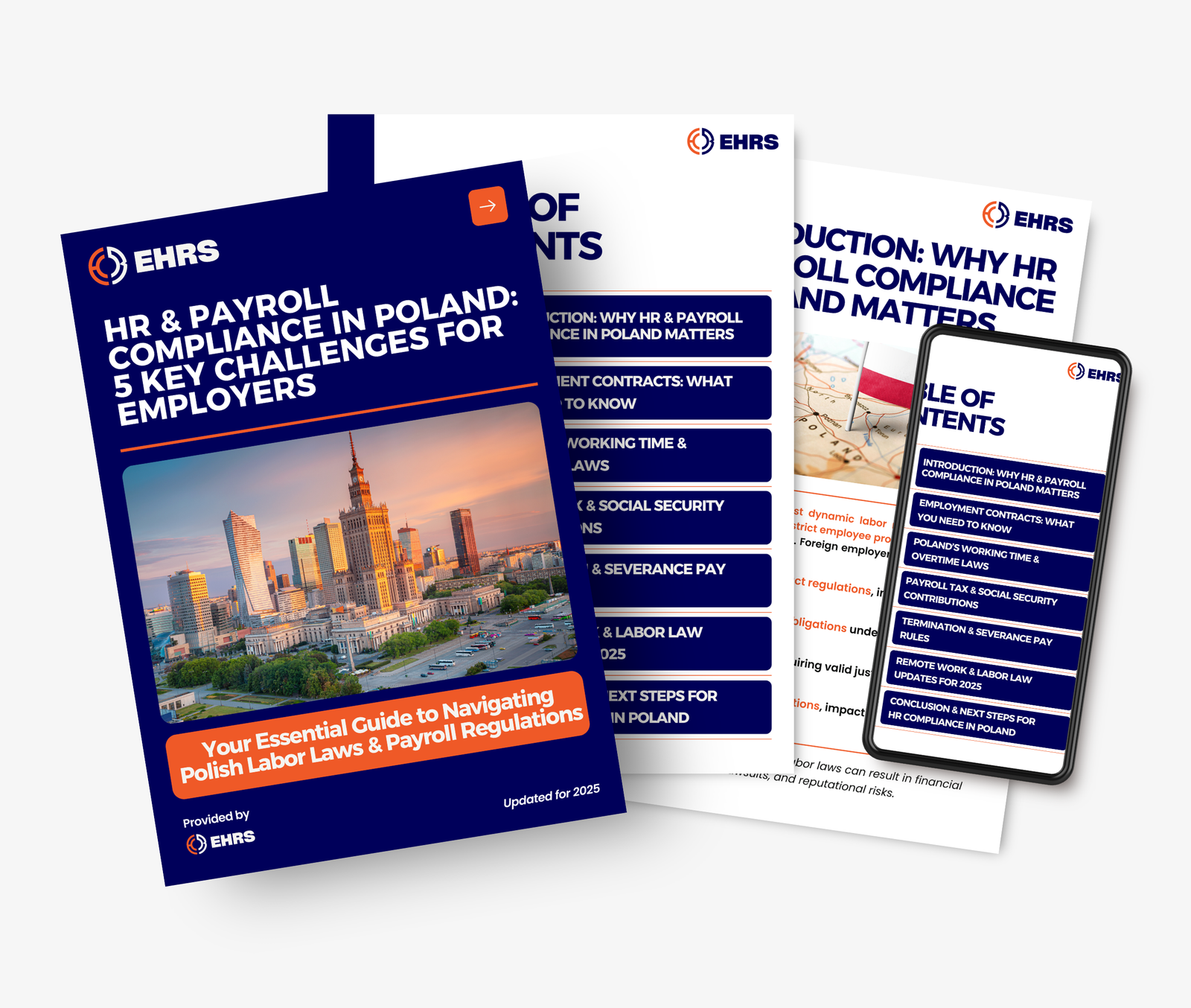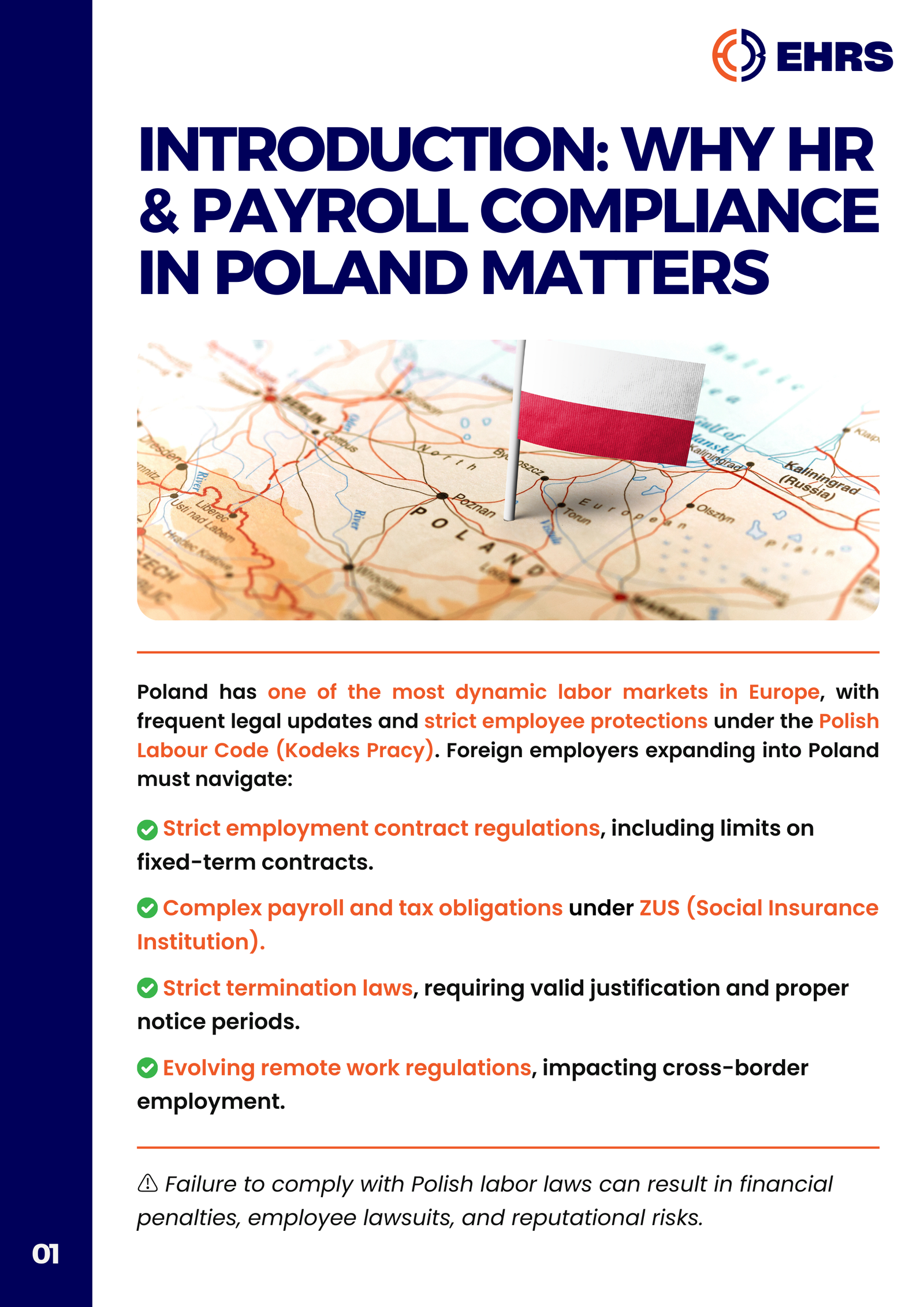POLAND
List of countries
HR Services for Poland
Hire in Poland without opening a local entity. We manage employment contracts in compliance with Polish labor law, handle social security (ZUS) and tax registrations, oversee payroll, and ensure full compliance with local regulations. With our expert HR services for Poland, your business can expand efficiently while staying fully compliant.
Over the past few decades, Poland has come a long way in growing its space in the global market. Based on its location, economic stability, political stability, private venture capital opportunities, and government business incentives, Poland’s appeal to US and UK companies expanding to Europe continues to grow.
HR provides the foundation for the success or failure of any small, mid-sized, or large business. However, building an inhouse HR department in a foreign country can prove time-consuming and expensive. HR outsourcing in Poland can be cost effective, alleviate your stress and allow you to focus on your US or UK company’s mission.
ALL YOU NEED TO KNOW ABOUT
HR OUTSOURCING IN POLAND
POLISH EMPLOYMENT
REGULATIONS TO KNOW
THE BENEFITS OF
EXPANSION IN POLAND
THE CHALLENGES OF
EXPANSION IN POLAND

Check our free HR guide to help you quickly improve your HR in Poland
FAQ for Poland
Learn more about Poland
Free Download
Request your free guide and receive it immediately

All You Need to Know About Outsourcing
Your HR in Poland with EHRS
Tailored HR Management
Europe HR Solutions provides end-to-end HR services for Poland, including payroll, recruitment, compliance, and employee management, all customized to meet local legal and business requirements.
Compliance with Polish Labor Laws
Poland’s labor regulations are comprehensive and employee-centric. We ensure your HR policies and practices comply with national and EU standards to avoid legal risks.
Cost-Efficient HR Solutions
Outsourcing HR in Poland reduces administrative costs and allows your team to focus on core business activities, while we handle the complexities of HR operations.
Poland Employment Regulations to Know
Employment Contracts
In Poland, written employment contracts are mandatory and must specify details such as job description, salary, working hours, and termination conditions. Through our tailored HR services for Poland, we ensure all contracts comply fully with the Polish Labor Code.
Working Hours & Overtime
The standard workweek in Poland is 40 hours (8 hours per day). Overtime is allowed but capped at 150 hours annually, and must be compensated with additional pay or time off.
Social Security Contributions
Employers must contribute to Poland’s social security system, which covers pensions, healthcare, and unemployment benefits. Contributions are mandatory and calculated as a percentage of the employee’s salary.
The Benefits of Expansion in Poland
Dynamic Economy
Poland has one of the fastest-growing economies in Europe, offering a large and diverse market for businesses in various sectors, including IT, manufacturing, and retail.
Skilled Workforce
Poland boasts a well-educated and skilled workforce, particularly in technology, engineering, and finance. English proficiency is high among young professionals.
Competitive Costs
Operating costs in Poland, including labor costs, are lower compared to many Western European countries, providing businesses with cost-saving opportunities while maintaining high-quality talent.
The Challenges of Expansion in Poland
Complex Labor Laws
Polish labor laws are detailed and require strict compliance, particularly regarding employee contracts, benefits, and termination procedures. Local HR expertise is essential to avoid legal issues.
Bureaucracy
Setting up and running a business in Poland involves navigating administrative processes such as tax registrations, work permits, and regulatory compliance, which can be time-consuming without local support.
Regional Variations
Economic conditions, talent availability, and business practices can vary across Poland’s regions, requiring localized strategies for recruitment and operations.
Talk to an HR specialist about payroll, compliance, and audits today.
Expand into Poland with confidence.
Most Asked Questions
About Poland
Why do I need a written employment contract in Poland? Can’t verbal agreements work?
Verbal agreements are not compliant with Polish labor law. Employers must provide a written employment contract before the employee starts working, or no later than the first day of employment. Failure to comply can result in fines or legal disputes.
Why It’s Risk-Free: We ensure all contracts meet Polish legal requirements, clearly outlining terms to protect your business from disputes or penalties.
Do I need to track working hours in Poland? Isn’t flexibility more practical?
Poland’s Labor Code limits regular working hours to 8 hours per day and 40 hours per week, with overtime restrictions. Employers must document hours to comply with the law and avoid penalties.
Why It’s Risk-Free: We help you implement systems to track working hours, ensuring compliance while maintaining flexibility where possible.
How much annual leave must I provide? Isn’t the statutory minimum enough?
Employees in Poland are entitled to 20-26 days of annual leave, depending on their tenure. Offering only the statutory minimum might suffice legally but could harm retention and employee satisfaction.
Why It’s Risk-Free: We structure leave policies that meet legal standards while remaining competitive to attract and retain top talent.
Parental leave in Poland seems generous. How can I maintain productivity while employees are on leave?
Employees in Poland are entitled to parental leave of up to 32 weeks, which can be shared between parents. Planning temporary replacements ensures productivity isn’t compromised.
Why It’s Risk-Free: We assist with workforce planning and leave compliance, helping you maintain operational stability while supporting employee needs.
Are collective labor agreements (CLAs) mandatory in Poland? Can’t I just create my own policies?
CLAs are not mandatory but can apply if your business is part of an industry with existing agreements. Ignoring applicable CLAs can lead to disputes or non-compliance penalties.
Why It’s Risk-Free: We identify whether CLAs apply to your business and align your policies to meet legal and industry standards.
How do payroll taxes work in Poland? What happens if I make an error?
Employers must deduct income tax, social security contributions, and health insurance from salaries. Errors in reporting or payments can lead to audits and fines.
Why It’s Risk-Free: We manage payroll compliance, ensuring accurate deductions and timely filings with Polish authorities.
Do I really need to focus on health and safety in Poland? Isn’t this just basic common sense?
Employers are legally required to conduct risk assessments and ensure a safe working environment under Polish labor law. Non-compliance can result in fines or legal claims.
Why It’s Risk-Free: We provide comprehensive risk assessments and safety policies, keeping your workplace compliant and employees protected.
Is compliance really worth the cost? Won’t it just increase my overheads?
Non-compliance costs—including fines, legal disputes, and employee turnover—far outweigh the investment in doing things right. Compliance also builds trust and operational stability.
Why It’s Risk-Free: We streamline compliance processes, saving you time and money while ensuring your business operates smoothly and legally.
Are probation periods necessary? What happens if I don’t use one?
Probation periods in Poland allow you to evaluate employees for up to 3 months. Without a probation period, terminating an unsuitable hire can be more complicated and require longer notice periods.
Why It’s Risk-Free: We create probation agreements that are legally compliant, giving you flexibility and reducing risks when assessing new hires.
Is overtime pay mandatory in Poland? Can’t I just offer extra time off?
Overtime pay is mandatory unless explicitly agreed otherwise. Employees are entitled to a 50%-100% premium for overtime hours or compensatory time off if specified in their contract.
Why It’s Risk-Free: We design overtime policies that comply with Polish labor laws, preventing disputes and ensuring clarity for your employees.
Do I need to pay employees during sick leave? Isn’t this handled by social insurance?
Employers must pay 80% of an employee’s salary for the first 33 days of sick leave each year. After that, payments are managed by the Social Insurance Institution (ZUS).
Why It’s Risk-Free: We manage sick leave processes and filings, ensuring compliance and reducing your administrative burden.
Termination laws in Poland sound restrictive. What if I need to reduce staff quickly?
Termination must comply with Poland’s Labor Code, which requires valid reasons, adherence to notice periods, and consultations in some cases. Failing to follow these rules can result in reinstatement orders or financial penalties.
Why It’s Risk-Free: We guide you through compliant termination processes, protecting your business from legal claims and ensuring fairness.
Are pensions mandatory in Poland? Isn’t salary enough for employees?
Employers must contribute to mandatory pension schemes as part of social insurance. Offering additional pensions can enhance your attractiveness as an employer.
Why It’s Risk-Free: We ensure pension contributions are compliant and help design packages that support employee retention.
Can I hire non-EU workers in Poland? Isn’t the process too complicated?
Non-EU workers can be hired under specific permits, such as the Poland Work Permit. However, the process requires proof of compliance with wage standards and documentation.
Why It’s Risk-Free: We handle the permit process, ensuring compliance and smooth onboarding for international hires.
What happens if I fail a compliance audit in Poland? Could it disrupt my business?
Non-compliance with Polish labor laws can result in financial penalties, back pay claims, or reputational damage. Inspections may review contracts, payroll, and workplace safety.
Why It’s Risk-Free: We proactively review your policies and practices, ensuring full compliance and preparation for audits or inspections.



